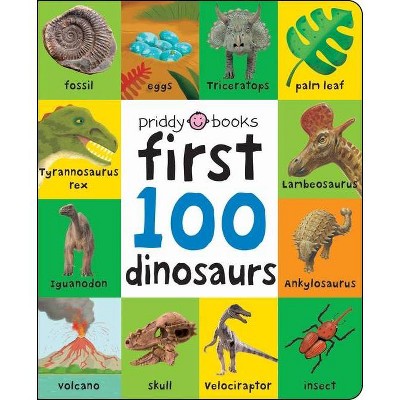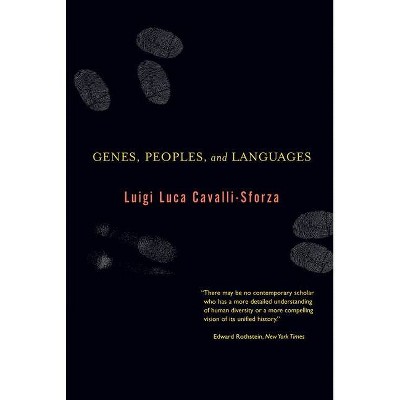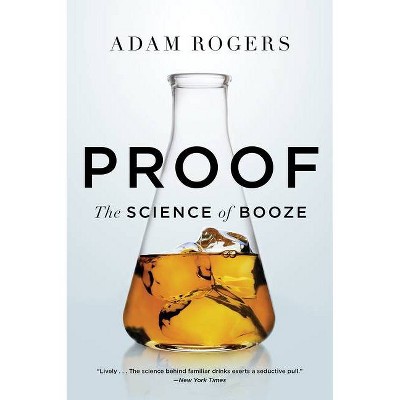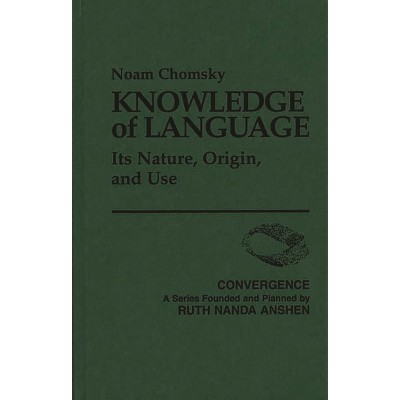Sponsored

The Language of the Genes - by Steve Jones (Paperback)
In Stock
Sponsored
About this item
Highlights
- Steve Jones's highly acclaimed, double prize-winning, bestselling first book is now fully revised to cover all the new genetic breakthroughs from GM food to Dolly the sheep.
- About the Author: Steve Jones is Professor of Genetics and Head of the Galton Laboratory, University College, London.
- 352 Pages
- Nature, Animals
Description
About the Book
Steve Jones's highly acclaimed, double prize-winning, bestselling first book is now fully revised to cover all the new genetic breakthroughs from GM food to Dolly the sheep.'An essential sightseer's guide to our own genetic terrain.' Peter Tallack, Sunday Telegraph
Book Synopsis
Steve Jones's highly acclaimed, double prize-winning, bestselling first book is now fully revised to cover all the new genetic breakthroughs from GM food to Dolly the sheep.'An essential sightseer's guide to our own genetic terrain.' Peter Tallack, Sunday Telegraph
'Superb and stimulating...an exhilarating trip around the double spiral of DNA, a rush of gravity-defying concepts and wild swerves of the scientific imagination.' J.G. Ballard, Daily Telegraph
'Not so much divination as demystification... An attempt to bring genetics and evolution more into the public domain. If, for instance, you ever wondered just what genetic engineering is about, here is as good a place as any to discover. Few have Jones's ability to communicate a difficult idea with such humour, clarity, precision and ease.' Laurence Hurst, Times Higher; 'Sensitive to the social issues raised by genetics... yet Jones's interest reaches beyond contemporary social issues to the human past, to what genetics can and cannot tell us about our evolution and patterns of social development. He interleaves a broad knowledge of biology with considerations of cultural, demographic and - as his title indicates - linguistic history. At once instructive and captivating.' Daniel J.Kevles, London Review of Books
From the Back Cover
A fully revised edition of the classic work on modern genetics, updated to coincide with the complete sequence of human DNA, cloning and genetically manipulated foods.
'Not so much divination or demystification...An attempt to bring genetics and evolution into the public domain. If, for instance, you ever wondered just what genetic engineering is about, here is as good a place as any to discover. Few have Jones's ability to communicate a difficult idea with such humour, clarity, precision and ease.'
LAURENCE HURST, 'Times Higher'
'Jones is sensitive to the social issues raised by genetics...yet his interest reaches beyond contemporary social issues to the human past, to what genetics can and cannot tell us about our evolution and patterns of social development. He interleaves a broad knowledge of biology with considerations of cultural, demographic and - as his title indicates - linguistic history. Jones's book is at once instructive and captivating.'
DANIEL J.KEVLES, 'London Review of Books'
'Trenchant, witty and enlightening...Jones's literate and wide-ranging book is an essential sightseer's guide to our own genetic terrain.'
PETER TALLACK, 'Sunday Telegraph'
This brilliant and witty book...is highly literate, and Jones goes a long way to bridging the deepening chasm between the two cultures. Not to know how genes affect us is to ignore the central factor in our lives.'
LEWIS WOLPERT, 'Daily Mail'
'Smoothly written and easily read...An absorbing and fascinating romp around the world of genetics.'
JOHN GRIBBIN, 'Sunday Times'
About the Author
Steve Jones is Professor of Genetics and Head of the Galton Laboratory, University College, London. In 1991 he gave the BBC Reith Lectures on the subject of genetics and evolution. In 1996, the Royal Society presented him with the Michael Faraday Award given annually to the scientist who has done the most to further the public understanding of science. Professor Jones was born in Wales, educated in Scotland and lives in London. He is co-editor of the Cambridge Encyclopedia of Human Evolution, and joint author of Genetics for Beginners and of the Open University's final-year genetics textbook. On balance he prefers snails to humans.
Shipping details
Return details
Frequently bought together

Trending Non-Fiction
















